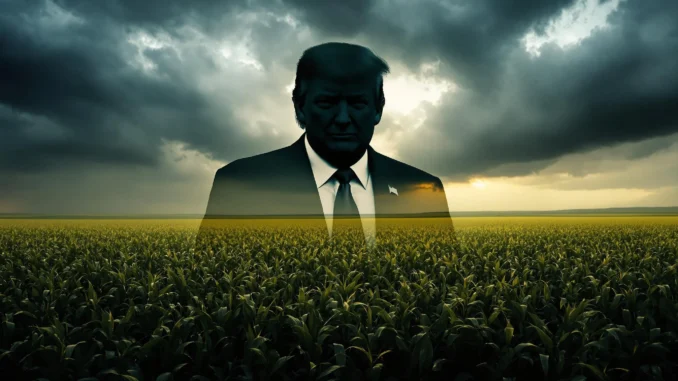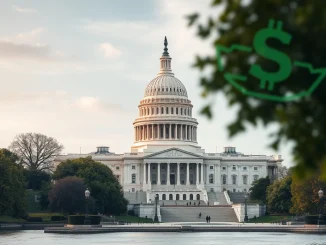
Hold onto your hats, folks! While the crypto world keeps spinning with its usual volatility, a major announcement outside our digital realm could send ripples across all markets, including ours. President Trump has declared tariffs on imported agricultural products, effective April 2nd. What does this mean for the global economy, and could it indirectly impact the crypto market? Let’s dive into this developing story.
Understanding Trump’s New Agriculture Tariffs
In a move that has already sparked debate and uncertainty, former President Trump has announced the imposition of new tariffs on agricultural imports to the United States. This announcement, reported by Jinshi Data, comes with a call for American farmers to ramp up their production. However, crucial details remain shrouded in mystery:
- Effective Date: April 2nd is the date set for these tariffs to take effect. This is just around the corner, leaving businesses and markets little time to prepare.
- Product Specifics: The exact types of agricultural products that will be subjected to these tariffs are still unclear. Are we talking about fruits, vegetables, grains, meats, or a combination? The lack of clarity breeds uncertainty.
- Exceptions: Will there be any exceptions to these tariffs? Will certain countries or specific products be exempt? Without this information, it’s difficult to fully assess the scope and impact.
This sudden announcement raises several critical questions. Why now? What is the intended goal? And most importantly, what will be the broader economic consequences?
Why Impose Tariffs on Agriculture Now?
To understand the potential motivations behind these Trump tariffs, we need to consider a few possible angles:
- Boosting Domestic Agriculture: The most direct and stated goal is to encourage American farmers to increase their production. Tariffs make imported goods more expensive, theoretically making domestically produced goods more competitive in the U.S. market.
- Economic Nationalism: This move aligns with a broader trend of economic nationalism, prioritizing domestic industries and jobs. It could be seen as a way to strengthen the U.S. agricultural sector and reduce reliance on foreign imports.
- Political Strategy: With upcoming elections, such policies can be politically motivated to appeal to specific voter demographics, particularly in agricultural regions.
- Trade Leverage: Tariffs can also be used as a tool in international trade negotiations, creating leverage to push for favorable trade agreements with other countries.
However, history has shown that tariffs are complex tools with potential downsides. While the intention might be to bolster domestic agriculture, the reality can be far more nuanced.
The Looming Shadow of a Trade War: Is it Back?
The term “trade war” might sound alarmist, but it accurately describes the potential escalation that tariffs can trigger. When one country imposes tariffs, it often leads to retaliatory measures from other nations. If the U.S. imposes tariffs on agricultural products, we could see:
- Retaliatory Tariffs: Other countries may respond by imposing their own tariffs on U.S. exports, potentially targeting other sectors beyond agriculture. This tit-for-tat escalation can harm businesses and consumers on both sides.
- Increased Costs for Consumers: Tariffs increase the cost of imported goods. These costs are often passed on to consumers in the form of higher prices for food and other products.
- Disrupted Supply Chains: Global supply chains are intricate and interconnected. Tariffs can disrupt these chains, leading to inefficiencies, shortages, and increased costs for businesses.
- Economic Slowdown: Widespread trade wars can dampen economic growth, reduce investment, and create uncertainty in global markets.
The prospect of a renewed trade war is a significant concern for businesses and investors worldwide. The crypto market, while often seen as detached from traditional finance, is not immune to these broader economic shifts.
Market Impact: How Could This Affect Crypto?
You might be wondering, “What do agriculture tariffs have to do with Bitcoin or Ethereum?” The connection is indirect but real. Here’s how these tariffs could ripple into the crypto sphere:
- Increased Economic Uncertainty: Tariffs contribute to economic uncertainty. When traditional markets become volatile or unpredictable due to trade tensions, investors might seek alternative assets perceived as safe havens or uncorrelated to traditional markets. Cryptocurrency, particularly Bitcoin, is sometimes viewed as such an alternative.
- Inflationary Pressures: Tariffs can lead to increased prices for goods. If these tariffs contribute to broader inflationary pressures, it could erode the purchasing power of fiat currencies. In such scenarios, some investors might turn to cryptocurrencies as a hedge against inflation.
- Risk-Off Sentiment: During periods of economic uncertainty driven by trade wars, a “risk-off” sentiment can prevail in markets. Investors might reduce their exposure to riskier assets, including stocks and potentially cryptocurrencies. However, conversely, in extreme uncertainty, some might see crypto as *less* risky than traditional markets facing direct tariff impacts.
- Dollar Strength/Weakness: The impact on the US dollar is complex. Initially, tariffs might strengthen the dollar. However, a full-blown trade war could weaken it in the long run. Dollar fluctuations can impact crypto markets, particularly Bitcoin, which is often priced against the dollar.
- Global Economic Slowdown: A significant global economic slowdown triggered by trade disputes would impact all markets, including crypto. Reduced economic activity can lead to less investment and potentially lower liquidity across asset classes.
Agriculture Sector Under Pressure: Farmer’s Perspective
While the stated aim is to help American farmers, the actual impact on the agriculture sector is complex and not universally positive. Let’s consider different perspectives:
| Perspective | Potential Impact of Tariffs |
|---|---|
| American Farmers (Specific Crops): | Potentially higher prices for their goods domestically if tariffs effectively reduce import competition. However, retaliatory tariffs could hurt their export markets. |
| American Farmers (Import-Reliant Inputs): | Increased costs for imported inputs like fertilizers, machinery parts, or animal feed if these are also affected by trade tensions. |
| Consumers: | Likely to face higher prices for food and agricultural products, potentially impacting household budgets. |
| Importing Nations: | May face disruptions to their agricultural exports to the U.S. and may need to find alternative markets or retaliate with their own tariffs. |
| Food Processing Industry: | Could face higher costs for raw agricultural materials if tariffs increase prices, potentially impacting their competitiveness. |
The agriculture sector is a vital part of the global economy, and disruptions in this sector can have far-reaching consequences. Understanding these diverse impacts is crucial for navigating the evolving economic landscape.
Navigating the Trade Landscape: Actionable Insights
So, what can we take away from this announcement of tariffs? Here are some actionable insights to consider:
- Stay Informed: This is a developing situation. Keep a close watch on news updates, especially regarding the specifics of the tariffs – which products are affected, and if any exceptions are announced.
- Diversify Investments: Economic uncertainty highlights the importance of portfolio diversification. Consider diversifying across asset classes, including traditional assets, cryptocurrencies, and other alternatives.
- Monitor Market Sentiment: Pay attention to market sentiment and volatility. Trade tensions can trigger rapid shifts in market behavior. Be prepared for potential fluctuations in both traditional and crypto markets.
- Long-Term Perspective: Tariffs and trade disputes are often temporary. Maintain a long-term investment perspective and avoid making rash decisions based on short-term market swings.
- Understand Global Interconnections: Recognize that the global economy is interconnected. Events in one sector or country can have ripple effects across the world, including the crypto market.
Conclusion: A Shockwave Through Global Trade?
President Trump’s announcement of tariffs on imported agricultural products is more than just a trade policy change; it’s a potential shockwave through global trade. While the immediate impact on the cryptocurrency market might be indirect, the broader economic uncertainty and potential for a renewed trade war are factors that crypto investors should not ignore.
As we await further details and observe market reactions, one thing is clear: the global economic landscape is becoming increasingly complex and interconnected. Staying informed, adaptable, and maintaining a long-term perspective will be key to navigating these turbulent times. Keep your eyes on the horizon, and remember that in the world of finance, change is the only constant.



